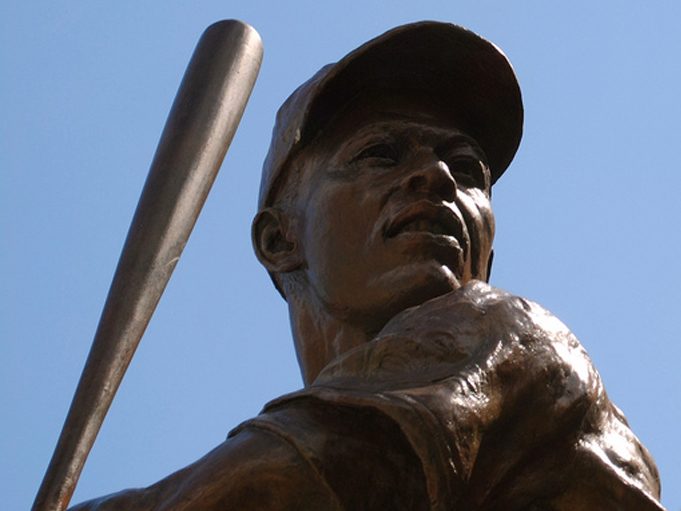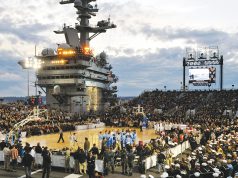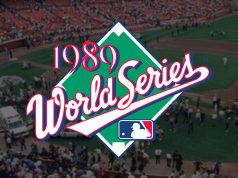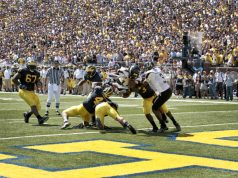It was perhaps the most sacred of all of baseball’s sacred records, but when Hank Aaron launched long ball number 715, he became baseball’s new home run king, dethroning the near-mythical Babe Ruth. Umpire Satch Davidson recalls the four-bagger that made history.
As Satch Davidson sat in the umpires’ room rubbing up baseballs for the night’s game, he glanced over at a second small batch of balls – the ones specially reserved for Hank Aaron’s at-bats. One thought kept crossing his mind: “Let’s just get this over with so we can get back to normal.”
On April 8, 1974, the largest crowd in Braves history (53,775) came out to witness history. What they hoped to see was the famously stoic Aaron hit what was sure to be the most exciting long ball in history, which would crown Aaron baseball’s new home run king.
The chase to beat the Babe heated up in the summer of 1973. So did baseball fans’ interest in Aaron, but not all of that interest was good. Aaron was receiving more than 3,000 letters a day as he approached Ruth’s career home run mark of 714, and a disturbing number of those letters was hate mail from racists unable to accept that a black man was about to displace the storied white slugger.
One infamous letter read: “Dear Nigger Henry, You are (not) going to break this record established by the great Babe Ruth if I can help it. … Whites are far more superior than jungle bunnies. My gun is watching your every black move.”
“This,” Aaron said later about the letters, “changed me.”
Aaron finished the 1973 season with 713 career home runs. The nation had to wait through another winter to witness the destruction of what many had thought was an unbreakable record.
The Braves opened the 1974 season in Cincinnati. In his first at-bat on Opening Day, Aaron homered off Reds pitcher Jack Billingham, tying Ruth. The Braves had considered benching Aaron for the first series so he could tie and break the record in Atlanta. But Aaron only sat out the second game and went 0-for-3 in the third game.
That set the stage for a grand homecoming against the Los Angeles Dodgers.
“I didn’t think too much about that game,” says Davidson, who retired in 1984 due to a back injury. “We knew about the record, we knew about the big crowd, but we had a job to do. It was just another game as far as we were concerned. Don’t get me wrong. We were happy for Hank because he was such a great ballplayer, but as an individual it was all business for him. He came out to the ballpark, played great in the outfield. When it was his turn to hit, he just got up there and did his thing and didn’t say too much. That’s how he was, and that’s how we approached it, too.”
Davidson had the dish for that game. Rounding out the crew were Frank Pulli, the late Ed Sudol and the late Lee Weyer. “For every game we had Hank Aaron, before he broke the record,” Davidson recalls, “we had to rub up a bunch of baseballs specifically for him when he came to bat. They had a number on them that you could look at under an ultra-violet light and they’d know if they had the right ball or not. Every time he’d come to bat, I’d have to take out all the other balls I had in my pockets and put the specially numbered balls in. And then we’d have to empty those all out and put the regular balls back in when he was done.
“When we got there that night, I just said, ‘Well, if he hits it tonight, good. It’ll be over with and we won’t have to go through all this changing out the balls anymore.’”
As cool as the umpires were, baseball administration was anxious, and security was everywhere because of the death threats. “Oh, there were a bunch of nervous folks around from the league office,” Davidson says, chuckling. “The head of the umpires back then, Fred Fleig, came into our room and he was climbing the walls. He said to me, ‘Aren’t you nervous?’ I looked at him and said, ‘About what? It’s a game we gotta work and someone’s got to win and someone’s got to lose. If he hits it, he hits it.’ And Fred says, ‘Oh, I gotta get out of here.’ He was a real good guy but he was more nervous than all of us umpires put together.”
As the umpires took the field and saw the sheer volume of the crowd, crew chief Sudol allowed for one tiny moment of awe as he quietly stated, “I’m glad I’m here. History might be made tonight.”
Aaron’s first at-bat resulted in a walk without even so much as a swing from the prodigious hitter.
But in the fourth inning with Atlanta down, 3-1, Aaron came to bat with a man on first. The first pitch from Dodgers pitcher Al Downing came in for a ball. And then came Downing’s second pitch, a high fastball over the plate.
“Downing threw the pitch, which wasn’t that good of a pitch but Hank sure liked it,” says Davidson. “He swung at it and boy, when he hit it, I said, ‘Well, we may see history right here.’ And (Joe) Ferguson, the catcher, looks up and says, ‘Yep, history has just been made.’”
The hit was a soaring line drive that just cleared the 385-foot sign in left-center field. Aaron began a memorable home run trot, receiving handshakes from the three Dodgers infielders and an escort from second to third by two over-exuberant college students.
“I was watching (Aaron) and of course that’s when two fans came out on the field,” says Davidson. “Right away I was worried because I had no idea what they would do, and police started to come out on the field and I said, ‘Oh no, please don’t do anything funny.’ Luckily the fans didn’t do anything too stupid, and as soon as he touched home plate the ceremony started.”
While the rest of the crew went to the dressing room, Davidson, as plate umpire, stayed on the field for the 11-minute break while teammates and family congratulated Aaron.
The excitement and energy in the stadium virtually disappeared for the rest of the game, which the Braves ended up winning, 7-4. “They had a sold-out house but by the seventh inning more than half of the crowd had left,” Davidson recalls. “They were all there to see that one thing happen and – boy, I’ll tell you what – it was magic in the ballpark when he hit it.”
What's Your Call? Leave a Comment:
Note: This article is archival in nature. Rules, interpretations, mechanics, philosophies and other information may or may not be correct for the current year.
This article is the copyright of ©Referee Enterprises, Inc., and may not be republished in whole or in part online, in print or in any capacity without expressed written permission from Referee. The article is made available for educational use by individuals.


















